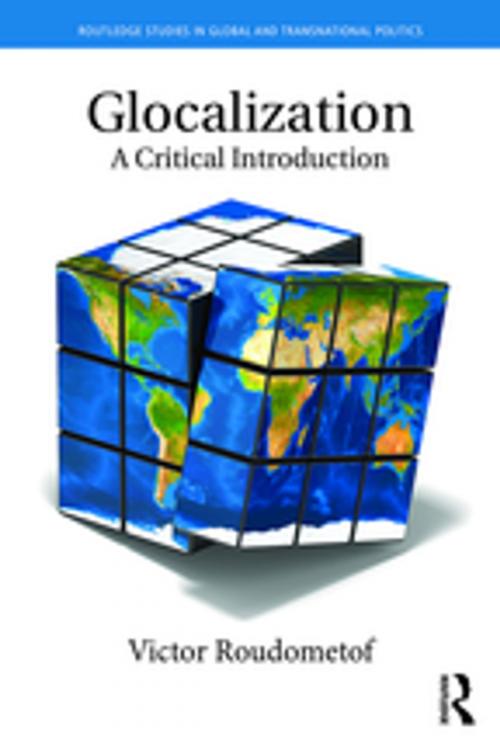Glocalization
A Critical Introduction
Nonfiction, Social & Cultural Studies, Political Science, International, International Relations| Author: | Victor Roudometof | ISBN: | 9781317936282 |
| Publisher: | Taylor and Francis | Publication: | June 10, 2016 |
| Imprint: | Routledge | Language: | English |
| Author: | Victor Roudometof |
| ISBN: | 9781317936282 |
| Publisher: | Taylor and Francis |
| Publication: | June 10, 2016 |
| Imprint: | Routledge |
| Language: | English |
This book seeks to provide a critical introduction to the under-theorized concept of Glocalization. While the term has been slowly diffused into social-scientific vocabulary, to date, there is no book in circulation that specifically discusses this concept. Historically theorists have intertwined the concepts of the ‘global’ and the ‘glocal’ or have subsumed the ‘glocal’ under other concepts – such as cosmopolitanization. Moreover, theorists have failed to give ‘local’ due attention in their theorizing. The book argues that the terms ‘global’, the ‘local’ and the ‘glocal’ are in need of unambiguous and theoretically and methodologically sound definitions. This is a prerequisite for their effective operationalization and application into social research.
Glocalization is structured in two parts:
Part I introduces the term, seeking to provide a history and critical assessment of theorists' past use of glocalization and offering an alternative perspective and a clear, effective and applicable definition of the term, explaining the limitations of the term globalization and the value of defining glocalization.
Part II then moves on to illustrate how the concept of glocalization can be used to broaden our understanding and analysis of a wide range of issues in world politics including the 21st century culture of consumption, transnationalism & cosmopolitanism, nationalism, and religious traditions.
Utilizing a wide range of historical, ethnographic and real-life examples from various domains this work will be essential reading for students and scholars of Globalization and will be of great interest to those in the field of Global, Transnational and Cosmopolitan Studies.
This book seeks to provide a critical introduction to the under-theorized concept of Glocalization. While the term has been slowly diffused into social-scientific vocabulary, to date, there is no book in circulation that specifically discusses this concept. Historically theorists have intertwined the concepts of the ‘global’ and the ‘glocal’ or have subsumed the ‘glocal’ under other concepts – such as cosmopolitanization. Moreover, theorists have failed to give ‘local’ due attention in their theorizing. The book argues that the terms ‘global’, the ‘local’ and the ‘glocal’ are in need of unambiguous and theoretically and methodologically sound definitions. This is a prerequisite for their effective operationalization and application into social research.
Glocalization is structured in two parts:
Part I introduces the term, seeking to provide a history and critical assessment of theorists' past use of glocalization and offering an alternative perspective and a clear, effective and applicable definition of the term, explaining the limitations of the term globalization and the value of defining glocalization.
Part II then moves on to illustrate how the concept of glocalization can be used to broaden our understanding and analysis of a wide range of issues in world politics including the 21st century culture of consumption, transnationalism & cosmopolitanism, nationalism, and religious traditions.
Utilizing a wide range of historical, ethnographic and real-life examples from various domains this work will be essential reading for students and scholars of Globalization and will be of great interest to those in the field of Global, Transnational and Cosmopolitan Studies.















